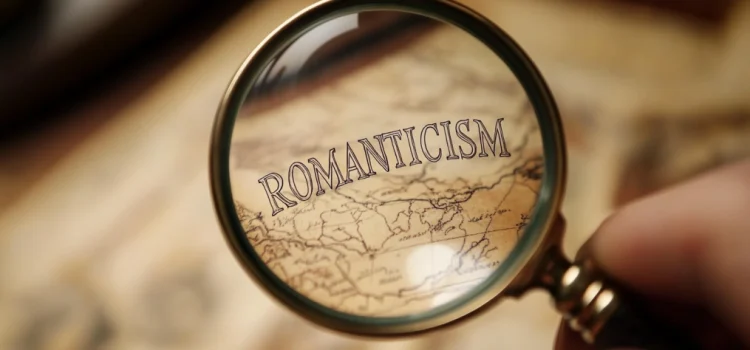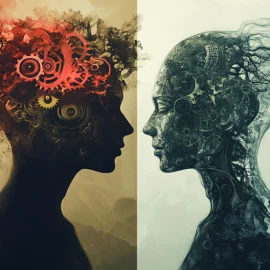

This article is an excerpt from the Shortform book guide to "The Blank Slate" by Steven Pinker. Shortform has the world's best summaries and analyses of books you should be reading.
Like this article? Sign up for a free trial here.
Is human nature inherently good or bad? Are we born altruistic or selfish?
In The Blank Slate, Steven Pinker explores the philosophy of romanticism and its impact on our understanding of human nature. He challenges the notion that humans are naturally benevolent and examines the scientific evidence against this view.
Read on for a thought-provoking critique of romanticism and its implications for individual and social progress.
The Philosophy of Romanticism
Although empiricism is the cornerstone of the mainstream intellectual view of human nature, Pinker contends that it’s typically accompanied by romanticism and provides a critique of romanticism. According to romanticism, humans are innately benevolent and altruistic, while our environments are responsible for our unsavory traits, like greed and aggressiveness.
This view, which is most commonly associated with 18th-century French philosopher Jean-Jacques Rousseau, suggests that individuals who develop free from corruptive societal pressures will remain perfectly good. Pinker reports that, for this reason, romanticism generally opposes authoritarian approaches to government and raising children, since both can corrupt otherwise good-natured people.
(Shortform note: Rousseau’s romanticism represented a negative reaction to the Enlightenment, a 17th- and 18th-century intellectual movement that uplifted reason as a method for understanding the universe. Rousseau, unlike Enlightenment thinkers, emphasized emotions like compassion as central to the human experience, prioritizing them over reason. But despite this difference, Rousseau agreed with Enlightenment thinkers who typically emphasized the importance of individual liberty in government.)
The Alleged Benefit of Romanticism
Advocates of the mainstream view of human nature discuss the benefit of romanticism. According to Pinker, many intellectuals embrace romanticism because it makes individual and social progress possible.
Let’s explore these proponents’ reasoning. To understand the connection between romanticism and progress, imagine that romanticism were false, meaning humans weren’t naturally benevolent and altruistic. If humans instead had a natural predisposition toward—for example—greed, violence, and dishonesty, it would appear futile to work toward progress. After all, if society is full of inherently immoral people, any hope of creating a just society seems ill-founded. Likewise, any hope of individual moral progress seems bound to fail.
(Shortform note: In contrast to the view that we’re naturally immoral, some scientists argue that we’ve evolved to have a deeply ingrained sense of fairness and justice because just societies best ensure our species’ survival. For this reason, they contend that the trend toward social progress is a predictable consequence of our nature: We’re naturally repulsed by unfairness and injustice, and therefore we aren’t content with flawed societies. In other words, evolution may have guided us toward the romantic view of humanity.)
Pinker’s Critique of Romanticism
However, Pinker argues that this line of reasoning stems from a shoddy inference. Contrary to the above argument, Pinker writes that humans don’t have to be incapable of altruism even if they aren’t naturally altruistic. It’s far more reasonable to think that humans are complex beings whose naturally problematic desires are tempered by abilities like self-restraint and reason. Consequently, progress is possible even if romanticism is false since humans can learn to conquer their desires.
(Shortform note: Pinker’s suggestion that our desires are tempered by reason has much in common with Plato’s tripartite account of the soul, which states that the soul is composed of desire, reason, and the spirit. According to Plato, the soul is most conducive to well-being when reason rules over desire, and the spirit assists reason in its rule—otherwise, we’d be overcome by unsavory desires.)
The Scientific Argument Against Romanticism
Pinker points out that evolutionary psychology is at odds with romanticism since evolution has steered the brain toward selfishness rather than romantic altruism.
He clarifies that, according to evolutionary psychology, the brain’s tendencies are byproducts of natural selection—the process by which genes that are most likely to be passed down to future generations are selected for and become more frequent. For example, because intelligent people are more likely to survive and therefore reproduce, genes for intelligence are selected for and—as intelligent people reproduce—become more frequent in the population.
Consequently, genes that encourage selfishness are likely to prevail over altruistic genes, because acting selfishly maximizes our chances of reproducing and passing down our genes. For instance, if our brains were predisposed to horde food, that would increase our chance of surviving long enough to reproduce.
| Evolution and the Problem of Altruism Although Pinker argues that evolutionary science is at odds with an altruistic view of human nature, some evolutionary biologists disagree. For example, in The Selfish Gene, Richard Dawkins acknowledges that although evolution generally predisposes us to be selfish, it can also instill altruism in settings where cooperation would help the whole group survive and reproduce. Experts point out that if natural selection only acted at the level of individual organisms, we’d have no reason to expect altruism to evolve. But, because organisms of the same species have significant genetic overlaps, natural selection might program us to act benevolently toward those who share our genetic material. For this reason, humans might feel inclined to share their resources with members of their family or broader society, even though doing so could decrease their individual chances of surviving long enough to reproduce. |

———End of Preview———
Like what you just read? Read the rest of the world's best book summary and analysis of Steven Pinker's "The Blank Slate" at Shortform.
Here's what you'll find in our full The Blank Slate summary:
- Why the view that humans are a blank slate is wrong
- Why humans have an innate tendency toward conflict
- How children’s personalities are inherited from their parents






